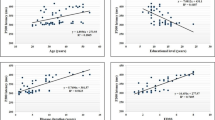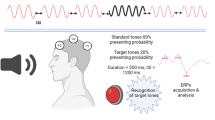Abstract
Approximately, 3–10% of patients with multiple sclerosis (MS) present a disease onset before the age of 18 years. Although growing attention is dedicated to cognitive impairment and its functional consequences in paediatric MS, so far no study has explored possible neurophysiologic correlates. The study’s aim was to describe event-related potentials in relationship with cognitive performance in children and adolescents with MS compared with demographically matched healthy controls (HC), providing two-year follow-up data. Six MS subjects aged between 9 and 17 years were assessed through an extensive neuropsychological battery at two time points. Event-related potentials with an odd-ball acoustic paradigm were also recorded in the patients and in nine HC. At baseline, four out of six patients failed three or more cognitive tasks and were classified as cognitively impaired. In all the cognitively impaired patients, we found abnormal latencies and amplitudes of the P300. After 2 years, five patients exhibited a deteriorating cognitive performance and a corresponding deterioration of the P300 parameters. In our group of children and adolescents with MS, changes in P300 parameters proceeded in parallel with deteriorating cognitive performance. P300 might represent an objective parameter to monitor cognitive changes in paediatric MS.

Similar content being viewed by others
References
Amato MP, Zipoli V, Portaccio E (2008) Cognitive changes in multiple sclerosis. Expert Rev Neurother 8:1585–1596
Amato MP, Ponziani G, Siracusa G, Sorbi S (2001) Cognitive dysfunction in early-onset multiple sclerosis: a reappraisal after 10 years. Arch Neurol 58:1602–1606
Amato MP, Ponziani G, Pracucci G, Bracco L, Siracusa G, Amaducci L (1995) Cognitive impairment in early-onset multiple sclerosis. Pattern, predictors, and impact on everyday life in a 4-year follow-up. Arch Neurol 52:168–172
Banwell B, Ghezzi A, Bar-Or A, Mikaeloff Y, Tardieu M (2007) Multiple sclerosis in children: clinical diagnosis, therapeutic strategies, and future directions. Lancet Neurol 6:887–902
Amato MP, Goretti B, Ghezzi A et al (2010) Cognitive and psychosocial features of childhood and juvenile multiple sclerosis: a reappraisal after 2 years. Neurology 75:1134–1140
Amato MP, Goretti B, Ghezzi A et al (2008) Cognitive and psychosocial features of childhood and juvenile MS. Neurology 70:1891–1897
Banwell BL, Anderson PE (2005) The cognitive burden of multiple sclerosis in children. Neurology 64:891–894
MacAllister WS, Belman AL, Milazzo M et al (2005) Cognitive functioning in children and adolescents with multiple sclerosis. Neurology 64:1422–1425
Piras MR, Magnano I, Canu ED et al (2003) Longitudinal study of cognitive dysfunction in multiple sclerosis: neuropsychological, neuroradiological, and neurophysiological findings. J Neurol Neurosurg Psychiatry 74:878–885
Magnano I, Aiello I, Piras MR (2006) Cognitive impairment and neurophysiological correlates in MS. J Neurol Sci 245:117–122
Kocer B, Unal T, Nazliel B et al (2008) Evaluating sub-clinical cognitive dysfunction and event-related potentials (P300) in clinically isolated syndrome. Neurol Sci 29:435–444
Pokryszko-Dragan A, Zagrajek M, Slotwinski K et al (2009) Neuropsychological testing and event-related potentials in the assessment of cognitive performance in the patients with multiple sclerosis—a pilot study. Clin Neurol Neurosurg 111:503–506
McDonald WI, Compston A, Edan G et al (2001) Recommended diagnostic criteria for multiple sclerosis: guidelines from the International Panel on the diagnosis of multiple sclerosis. Ann Neurol 50:121–127
Kovacs M, Adatt IT, Camuffo MC et al (1988) C.D.I. Children’s Depression Inventory. Questionario di Autovalutazione. Organizzazioni Speciali, Firenze
Acknowledgments
We thank Mrs. Angela Mastronardi Lab Tech and Mrs. Katiuscia Romano, Lab Tech Department of Neurophysiopathology, University of Florence, for their technical assistance in recording event-related potentials.
Author information
Authors and Affiliations
Corresponding author
Rights and permissions
About this article
Cite this article
Lori, S., Portaccio, E., Zipoli, V. et al. Cognitive impairment and event-related potentials in paediatric multiple sclerosis: 2-year study. Neurol Sci 32, 1043–1046 (2011). https://doi.org/10.1007/s10072-011-0602-8
Received:
Accepted:
Published:
Issue Date:
DOI: https://doi.org/10.1007/s10072-011-0602-8




